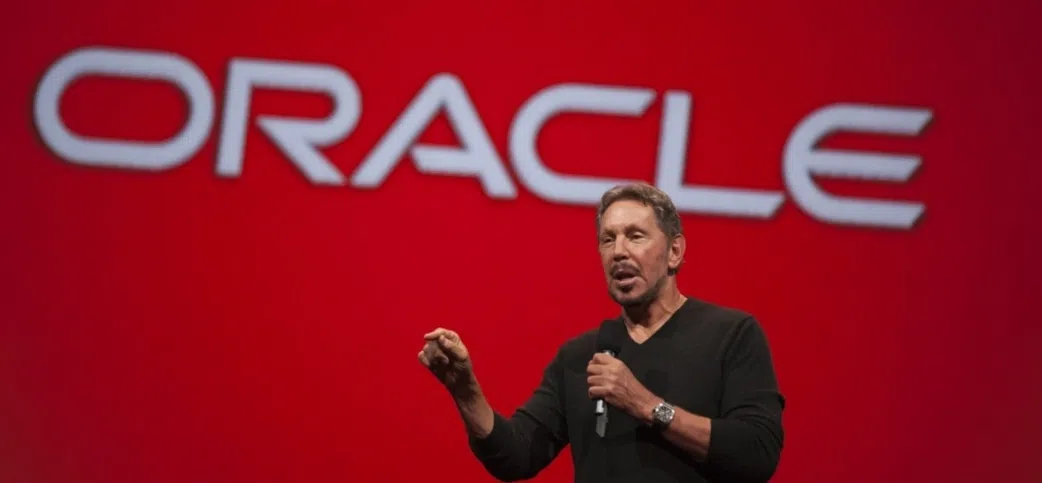On September 10, 2025, the global business community witnessed a historic financial milestone as Larry Ellison, co-founder and executive chairman of Oracle Corporation, reportedly became the world’s richest individual for a brief period. According to figures cited by Bloomberg Billionaire’s Index, Ellison’s estimated net worth soared to approximately US$393 billion, overtaking tech magnate Elon Musk. This monumental achievement followed a remarkable single-day wealth surge, allegedly increasing by $89 billion on the back of Oracle’s impressive financial results.
The driving force behind this leap was the surging global demand for Oracle’s data centre capacity among artificial intelligence (AI) clients. Oracle Corporation (ORCL) has been a major beneficiary of the AI boom, witnessing a historic rally in its stock price after reporting robust quarterly earnings. For West African entrepreneurs and investors, Oracle’s story is a powerful illustration of how strategic investment in emerging technology—especially AI and data infrastructure—can deliver outsized returns.
Ellison’s reported one-day wealth jump of $101 billion stands out as the fastest increase ever observed on the index, surpassing previous records by considerable margins. Analysts in Lagos and Accra have pointed to this event as a testament to the explosive potential of the tech sector—even when compared to the growth experienced in other dynamic industries such as banking or oil and gas in the African context.
Although his brief time at the top was quickly challenged by Elon Musk, the fierce rivalry between Ellison and other global tech leaders continues to make headlines. For many in Nigeria and across Africa who watch these global wealth rankings, such stories serve as motivation for building tech-driven businesses that can disrupt traditional sectors and attract international investment.
Early Life and Education
Larry Ellison’s route to extraordinary wealth was far from conventional. Born into modest circumstances, Ellison attended the University of Illinois before transferring to the University of Chicago. However, he left both institutions without completing his degree. While some may view this as a setback, Ellison’s time at university exposed him to computer science and mathematics—subjects that provided the technical foundation for his future innovations.
Rather than following a typical academic path, Ellison relied on the expertise he gained through self-directed learning and hands-on experience. His early exposure to programming reflects a reality familiar to many talented young Africans: success does not always demand formal credentials, but curiosity, grit, and continuous learning.
After leaving university, Ellison partnered with Bob Miner and Ed Oates, laying the groundwork for what would become Oracle Corp. His bold move to forgo a traditional degree was echoed decades later in the stories of Nigerian and Ghanaian tech entrepreneurs, many of whom dare to break with convention to chase innovation.
The Genesis of Oracle

Oracle’s origins trace back to the 1970s when Ellison was a computer programmer at Ampex Corporation. There, he worked on a groundbreaking project: designing a database system for the CIA, code-named “Oracle.” According to tech historians, this early project sowed the seeds for a global technology giant that would revolutionize data management.
Building on this experience, Ellison was inspired by Edgar F. Codd’s academic paper on relational databases, titled “A Relational Model of Data for Large Shared Data Banks.” This research provided the theoretical underpinnings for what would later become the backbone of business data operations worldwide. Ellison’s ability to commercialize such innovations mirrors the aspirations of many African startups now looking to transform university research into commercial products.
By 1977, together with Miner and Oates, Ellison established Software Development Laboratories in Santa Clara, California. Under contract from the CIA, their small team developed what would emerge as the Oracle database, launching a business with fewer than ten employees and annual revenues under $1 million—a relatable story for many local ICT startups seeking to grow on limited capital.
The true inflection point arrived in 1981, when IBM selected Oracle as its preferred database solution. This partnership with a global computing leader gave Oracle crucial market validation and the stepping stone needed for rapid expansion. Nigerian tech entrepreneurs can look to such partnerships as examples of how to scale up and attract international recognition.
Building the Oracle Empire
As Oracle’s founder and later its chairman and chief technology officer, Ellison turned a humble startup into a juggernaut of the tech world. He led as CEO until 2014, overseeing the company’s pivot from niche software provider to a dominant force in enterprise technology—a path that offers lessons for African founders striving to scale their businesses beyond local markets.
Starting Oracle in his early 30s, Ellison guided its ascent so rapidly that within just eight years, the company placed on Inc. magazine’s list of the 500 fastest-growing private companies in America. His relentless growth strategy included a focus on aggressive acquisitions—an approach many Nigerian CEOs now look to when plotting their own growth in tech or financial services.
Oracle’s acquisition spree ramped up in the early 2000s, as the company absorbed rivals such as PeopleSoft, Siebel, BEA, and Sun Microsystems. According to company filings, these multibillion-dollar buyouts cemented Oracle’s dominance and diversified its software portfolio. “The Nigerian tech sector may see similar consolidation in the future as local platforms seek scale,” observed Obi Amaechi, a Lagos-based technology analyst, in a 2024 industry survey.
CHECK THIS OUT: 12 High-Paying Jobs in Ghana You Can Do Without a University Degree
The momentum continued into the next decade, with Oracle acquiring NetSuite for an estimated $9 billion in 2017. Ellison was not content to rest; he moved quickly to position Oracle at the forefront of global cloud computing, directly challenging the likes of Amazon Web Services (AWS). This shift towards cloud services is particularly relevant for African firms, many of which are now leveraging the cloud to expand access to banking, e-commerce, and logistics.
In recent years, Oracle’s strategy has included recruiting high-value talent away from competitors, demonstrating that global success is underpinned not only by innovation but also by a commitment to attracting and retaining skilled professionals—a point echoed by industry experts at Nigeria’s Techpoint Africa conference.
Current Role and Influence
Today, Ellison remains a central figure at Oracle as both chief technology officer and executive chairman. He reportedly owns around 41% of the business (as declared in a July 2025 regulatory filing), and the performance of Oracle’s stock has a direct impact on his personal fortune. For local investors and business owners, Ellison’s story underscores the value of significant equity stakes in high-growth enterprises—and the volatility such fortunes can experience.
According to data from Bloomberg and market filings, Ellison’s wealth recently eclipsed that of Elon Musk, moving him into the rarefied air of the world’s wealthiest. His leadership, innovation, and willingness to push boundaries have cemented his standing among the global elite—a level of success that many up-and-coming African innovators now seek to emulate.
Strategic Investments and Diversification
Ellison’s portfolio extends well beyond software. Notably, in 2018 he invested around $1 billion to acquire 15 million shares in Tesla, Inc., the electric vehicle company led by Elon Musk. This move has paid off handsomely, as Tesla’s market value has surged in recent years, making it a textbook case in the benefits of diversification for African high-net-worth individuals.
Strategic investment, especially in disruptive sectors, is increasingly becoming part of African business strategies. From fintech in Lagos to green energy in Accra, local investors are looking to global models like Ellison’s for inspiration on how to build portfolios that weather market shocks and deliver long-term growth.
Personal Ventures and Lifestyle
Known for his eclectic interests, Ellison’s wealth reaches beyond the boardroom. Among his headline-grabbing acquisitions is his ownership of about 98% of Lānaʻi, Hawaii’s sixth-largest island, which he purchased with an aim to support sustainable initiatives and unique architectural projects. This penchant for grand ventures resonates with a generation of African entrepreneurs who aspire not only to business success but to make lasting social and environmental impacts.
Business Philosophy and Reputation
Oracle started as a leader in the database market but soon ventured into new territories, including systems hardware, developer tools, collaboration platforms, and middleware. Larry Ellison’s approach is described as unapologetically bold and highly competitive. While admired by many as a visionary, his aggressive approach has occasionally sparked controversy and rivalry with tech titans such as Microsoft’s Bill Gates and IBM.
As one of Silicon Valley’s most visible—and at times divisive—figures, Ellison’s influence is felt globally. Technology commentators from Lagos to Johannesburg often point to Oracle’s fierce competitive culture as a blueprint for companies determined to crack global markets in the face of formidable international contenders.
The AI Revolution and Oracle’s Future
Oracle’s meteoric market cap growth in recent months is largely attributed to its strategic response to the artificial intelligence revolution. As demand for AI infrastructure skyrockets, so too does the value of data centres capable of hosting and managing AI workloads. According to Reuters and industry reports, the company’s foray into AI cloud infrastructure has positioned it among a critical group of providers for the next generation of global technology.
This development is not just relevant for Wall Street. Across West Africa, local startups are increasingly leveraging AI to solve local challenges—ranging from financial inclusion to health technology. The Oracle story offers lessons for Nigeria and the wider African continent: preparation, adaptability, and timing can unlock transformative opportunities in even the fast-changing technology sector.
As Oracle advances its AI and cloud ambitions, Ellison’s ongoing leadership and visibility ensure his continued relevance—nearly five decades after first entering the industry. His journey serves as a reminder that visionary thinking and strategic risk-taking can create outsized success, even in unpredictable market conditions.
The meteoric rise of Larry Ellison and Oracle prompts important questions for Nigerian and African entrepreneurs: what lessons can be drawn from his approach, and how can local businesses position themselves to seize the opportunities of the digital and AI era? What do you think Nigeria’s tech landscape could look like if more local companies aspired to global impact on this scale?










